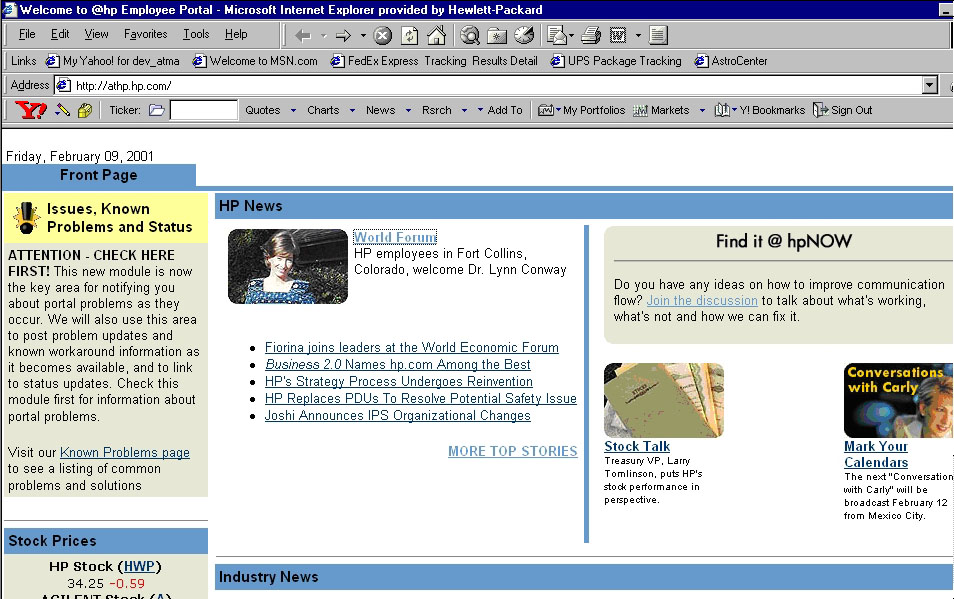|

-
- Embracing Diversity
HP employees in Fort Collins,
Colorado, welcome Dr. Lynn Conway
-
- Posted February 8, 2001
Dr. Lynn Conway is well known in the computer industry and within
academia for her pioneering work in chip design. Conway helped
develop the integrated circuit design behind VLSI (very large
scale integration), a design and manufacturing approach that
increased the number of transistors on a chip from thousands
to millions. A co-author of the widely used engineering textbook,
Introduction to VLSI Systems, she is also a member of the National
Academy of Engineering and a professor emerita of electrical
engineering and computer science at the University of Michigan.

Dr. Lynn Conway
Beyond the distinguished curriculum vitae lies a remarkable personal
journey. Born a biological male, Conway was one of the first
transsexuals to have a full sex-change operation in the 1960s.
It is this story of a career filled with industry-transforming
accomplishments — and seemingly unsurmountable challenges
overcome — that HP employees gathered to hear January 25
at the Fort Collins, Colorado site. During a two-day visit, more
than 100 employees and managers from four local HP offices flocked
to events that focused on Conway's technical research, her life
experiences and diversity issues within companies.
-
- During Conway's presentation to employees,
she chronicled the personal and professional paths she has traveled.
Born and raised as a male in the 1940s and 1950s, Conway realized
from an early age that she had the gender identity of a woman.
While working as a computer scientist at IBM in the 1960s, she
began undergoing a gender transition. However, prior to her male-to-female
sex reassignment surgery, Conway was fired.
-
- An HP collaboration
-
- Following the successful surgery, Conway
launched her career anew, eventually landing a job at Xerox's
Palo Alto Research Center (PARC) in the 1970s. It was during
her tenure at PARC that her career intersected with HP. The late
Merrill Brooksby, an HP manager, and Pat Castro, then manager
of the Integrated Circuit Lab at HP's Deer Creek site, collaborated
with Conway to provide the fast-turnaround wafer she needed to
accelerate her VLSI research.
-
- For Conway, starting a new life and career
as a woman meant leaving behind all connections to her earlier
achievements, including her groundbreaking research at IBM. While
her professional work continued to flourish, she lived more than
30 years in self-described "stealth mode." Recently,
Conway has begun to share her story with others, compelled to
speak out, she says, because transsexual women still experience
inhumane treatment by families, employers and society.
-
- When Terry Hildebrandt, a member of HP's
CGLEN (Colorado Gay, Lesbian, Bisexual, Transgendered Employee
Network), invited Conway to come to HP, the professor didn't
think twice.
-
- "I've always felt I've owed a debt
of gratitude to HP," Conway says. "The company has
always had a very down-to-earth, community feeling that is very
welcoming. It's important to preserve that atmosphere."
-
- New challenges
-
- In a separate discussion with more than
20 human resources managers and GMs from Colorado's HP sites,
Conway discussed the growing number of surgical sex reassignments
and the resulting challenges for companies.
-
- "It's important that companies begin
putting guidelines in place to deal with the issues surrounding
someone going through a transgender transition," Conway
says.
-
- "After hearing her story, I left
with a better understanding of how important it is to allow people
to be individuals and appreciate the uniqueness each brings to
the environment," comments Jaime Mares, Workplace Solutions
HR manager. "When you create a safe environment for people,
you allow the freedom of individuals to exchange ideas."
-
- "Dr Conway's visit was an incredible
success," adds CGLEN's Terry Hildebrandt. "All the
events were well attended and she was very well received. The
first of the Rules of the Garage is 'Believe you can change the
world.' Dr. Conway has inspired me to really believe that this
is possible."
-
- The dangers of conformity
-
- A company emphasis on conformity can stifle
growth and individuality, Conway cautions. Echoing one of CEO
Carly Fiorina's frequent messages, Conway also added that diversity
encourages self-expression and helps fuel creativity.
-
- "Employees need to see diversity
in their work environment," she warns. "Otherwise,
they're afraid to reveal anything different about themselves
— even ideas."
-
- High-tech companies like HP, Conway adds,
have the power to influence the communities of which they are
a part, simply by their attitudes toward diversity.
-
- "If companies welcome diversity,
they can be wildly exciting places," says Conway. "They
have the potential to be forces of cultural change in communities."
-
-
-
- Read a related article in Scientific
American.
- Visit Lynn
Conway's website.
- Learn more about Global Diversity &
Work Life at HP.
-
-
- © 2001 Hewlett-Packard Company
|

